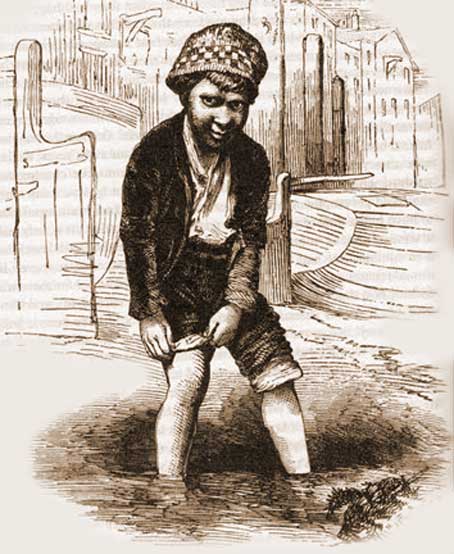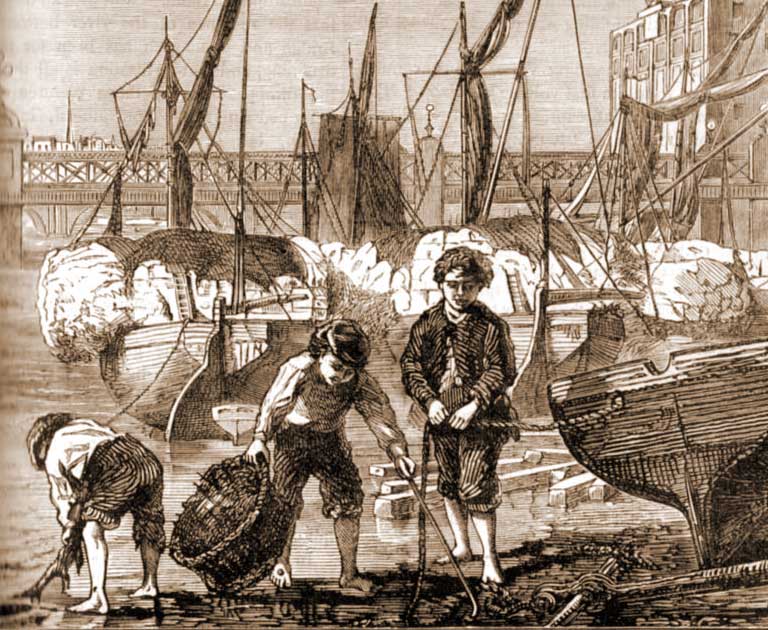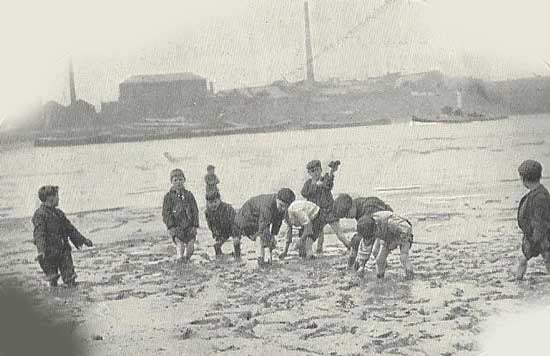Mudlarking was an occupation that was prevalent between the late 18th and early 20th centuries. Mudlarks were often children, mostly young boys, who would scavenge along the banks of the River Thames, below London Bridge, and pick up chunks of coal that might have fallen from the coal barges, bits of old rope, nails, pottery and even bones, which they would then sell for a few pennies.
They earned meagre amounts of money, were renowned for dressing in ranks, and the stench that emanated from them, was, supposedly, absolutely awful.
However, it was a profession that fascinated the Victorian reading public, and, as a consequence, numerous newspaper articles were published in the latter half of the 19th century, for which various journalists and authors attempted to provide their readers with an insight into the lives of the mudlarks.

A FAMILY OF MUDLARKS
The Yorkshire Post and Leeds Intelligencer, pubslished the following article about a family of mudlarks, on Tuesday, 31st May, 1870.
You cannot help but admire the sheer determination demonstrated by the children whom the author managed to waylay, as they set out for a day’s scavenging by the Thames.
The article read:-
LONDON MUDLARKS
“The first real insight I got into the miseries of a young mudlark’s life I obtained from a quaint trio of them, whom I took illegal possession of as they were trotting past the school-door one day when I had come down, and, as usual, had found the teacher in almost solitary possession of the room.
RAGGED, DIRTY AND LEAN
Two brothers and their little sister made the number of my captives.
They were all very ragged and dirty; they were all very lean, but there was just a hint of childhood’s pretty chubbiness in the curly-headed little girl’s face.
A queer little “Daughter of the Regiment” she looked, trudging along with an old fig-drum slung from her shoulder to put her findings in.
Her elder brother had an old nosebag for his receptacle, the younger an old saucepan.
The little girl seemed to be about five years old; her brothers about eight and seven.
THEY PUT UP A FIGHT
When I took hold of the little girl’s hand, she raised a piercing scream, and her brothers, who were a little way ahead, instantly dashed back to the rescue. Up to their breasts went their little clenched right fists backwards and forwards worked their little clenched left fists; “Kick his shins, Sally,” “Bite his thumb, Sally,” they shouted. They danced around me with gestures, and looks and words of contemptuous defiance, and then putting down their heads, they rushed in, and assaulted me in the most vigorous manner; little Sally, meanwhile, kicking like a little donkey, and biting and scratching like a cat.
By a change of front, however, I contrived to cut off the enemy from the river, and then, extending my flanks, I succeeded in sweeping them before me into the school-room, where, after a time, I succeeded also in making them believe that my intentions were better than they looked.
MONEY UPFRONT!
No doubt Jack, the chief speaker, put a somewhat exaggerated value on the earnings they might have made had I not kept them from their work, but after all the indemnification which I had to pay in advance to my young friends – Jack standing out for that before he would give me, or allow his brother or sister to give me, any information – was no great tax, even upon my scantily furnished purse.
They were in the habit of selling half quarter a hundredweight of coal, picked a piece at a time, for a penny, and therefore, a shilling to be divided amongst them for doing nothing but talk seemed a wonderful bargain them.

THEY HAD NO PARENTS
I found that they had no father or mother – “Not as we knows on.”
Jack remembered his father, fancied that he must have been a sailor, and that he gave money for their keep to the old woman with whom he left them when he went to sea.
Neither of the other children had any recollection of their parents, and Jack could not remember his mother. “We lives with the old cat still,” Jack went on, “pays her for our lodgin’, grubs ourselves.”
“She’s a old witch,” brother Bill interjected – “cross as two sticks. She whops Sally when we ain’t by. She’s afeared to when we is, ‘cos we butts her till she’s fit to bust – don’t she blow, Jack?”
“But why do you live with her if she isn’t kind to you?”
“I didn’t say nuffink about her not being kind”, answered Jack. “She ain’t game to whop me and Bill, and when she pitches into Sally, we sarves her out somehow. May as well live there as anywhere else, s’far as I sees. When we can’t pay our lodgin’, she turns us out, and we sleeps jest where we can. But we goes back when we’ve got the browns. Bill and me could manage, but it’s cold for little Sally – dossin’ out is, though we puts her in the middle, and cuddles up.”
PLACES WHERE THEY SLEPT
I asked him in what kind of places they slept when deprived of their regular lodgings. ”
Sometimes aboard the empty coal barges, and under a boat if it’s ‘andy. There’s the pipes, too, when the roads is up – they ain’t bad if you get one so as the wind can’t cut through it. There was a old chap once, when the roads was up, give us a warm by his fire, and a sack to kiver up. Down by the Sun too ain’t a bad place, where they throw the hashes. And there’s the little harches behind ‘Alfmoon Stairs – they’d be snug if it wasn’t quite so mucky – an’ there’s rats there, an’ Sally don’t like rats. All kind o’ places we could doss in, if it worn’t for little Sally.”
This, however, was said with no tone of reproach. The two brothers were plainly as fond as boys could be of their little sister – the way in which she wedged herself between them during our interview showed how accustomed she was to their affectionate protection.
THEIR REGULAR LODGINGS
I afterwards saw the regular lodgings of this little self-supporting family. They consisted of what was really merely a triangular cupboard without a door – a space boarded off from a filthy landing at the top of a filthy, crooked staircase. A mat and singed ironing-blanket, full of holes and dropping to pieces, were literally all the furniture.
The “old witch” anxiously informed me that she charged them nothing for this kennel, and gave them the free run of her kitchen, only taking a penny or two from them for the use of her fire when coals were very dear; but the different story I had heard from the children appeared the more probable.
The landlady did not look like one given to perform actions in any degree disinterested, and when she found that her professions of kindness did not meet with pecuniary acknowledgement, she changed her tone, and abused both the children and the person who was inquiring about them with a most vigorous virulence.
RESCUED FROM THE OLD WITCH
I am happy to say that I rescued the children from the “old witch’s” clutches.
It would have been absurd to expect a poor woman like her to give the children even such lodging as she did give them for nothing. What were they to her? Only the orphans of a dead sailor who at one time paid her pretty liberally for their keep. But the woman had charged the children most exorbitantly. I will not mention the sum, because few people whose income is counted in pounds – even a very modest amount of pounds – can realise the crushingly important proportion which an expenditure of a few pence weekly bears to a weekly income of only a few pence more.
The poorest of the poor are often most kindly helped by those who are a mere shade less poor, but they are also sometimes preyed upon by their next “superiors” as the smallest fish are gobbled by those a trfile larger.”

LONDON MUD-LARKS
The Forres Elgin and Nairn Gazette, Northern Review and Advertiser Wednesday, 26th August, 1903:-
“Miss Dorothy Menpes appears to have an intimate knowledge of the tribe of mud-larks which are to be found along the banks of the Thames below Loudon Bridge.
In the “World’s Children,” she thus writes of these curious little people:-
THE SCAVENGERS OF THE THAMES
“Among London children are the mud-larks, the small scavengers of the Thames, generally clothed in scanty jackets, sunshine, and mud, wriggling unceasingly in and out of chains and anchors, and curling round about the figureheads of the barges, never for one moment still, slippery and elusive as eels.
They are very mischievous sprites, these children, always appearing where you least expect them, always ferreting about with those terribly keen black eyes of theirs, and frequently swooping down like seagulls upon some hidden treasure embedded in the mud; and their chief anxiety seems to consist in evading the Thames police.

THEIR OWN LANGUAGE
They have a language of their own, as impossible to comprehend as to imitate; it is a special mud-lark patois, and appears to be a mixture of the swear words of sailors and the slang of landsmen.
There are generally fights going on among these urchins for the possession of some treasure; and their constant enemies are the bargees, whom they delight to cheat and annoy by clinging to ropes and chains, thereby getting a ride gratis, as a street boy does on a Putney bus.
A HANDSOME RACE
The fathers of these mud-larks live in old tumbledown sheds on the Thames wharves, and are as handsome a race of men as you could wish to see, often employed as models by artists, who delight in their fine proportions.
The boys are, in their small way, handsome too. They are freckled, with mops of shaggy reddish hair, apparently borrowed from the rust of the barges under which they dive with the greatest ease and facility.
THEY ASPIRE TO BECOME COSTERS
When they grow older they do not often become sailors; mud-larks have a wholesome contempt for the sea – it is too tame and uneventful. What they do aspire to is to own a “moke,” otherwise a donkey, and drive a coster cart. To possess a “moke” is to have a high social position indeed.”
